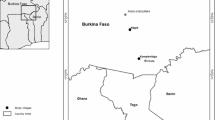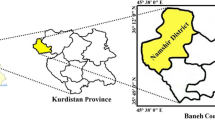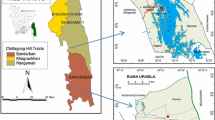Abstract
Despite the importance of forests to the communities in rural Tanzania, information is scarce regarding the contribution of non-timber forest products to household incomes. Based on the variation in institutional regimes and income categories, we aimed to assess the contribution of NTFPs to the households in rural communities of West Usambara, comparing those households located around state and community managed forests. We randomly sampled 159 households from four villages at the fringes of jointly managed forests and community managed forests in the West Usambara Mountains. Household income accounting and cluster analysis were employed, in order to categorize households into income groups based on their total income. We observed a significantly higher amount of NTFPs income for households located around the state than the community managed forest, and high-income households had high absolute but lower relative NTFPs income. The NTFPs proved to be crucial in poverty and inequality aspects of the low-income households. Our findings imply that NTFPs are important income sources in rural communities and insightful assessment is needed, within a particular context, to understand the local situation. Interventions that improve the conservation of forests and NTFP flows to rural communities are important to the rural development agenda.



Similar content being viewed by others
Data availability
The data used for this study are available and can be provided upon request.
Notes
Factor 1 for adults from 15–64 years; factor 0.5 for children below 15 years; and adults above 64 years.
The countries involved included Burkina Faso, Senegal, Ghana, D.R Congo, Mozambique, Uganda, Zambia, Malawi, and Zambia.
Abbreviations
- CBFM:
-
Community-based forest management
- FAO:
-
Food and Agriculture Organisation of the United Nations
- IGAs:
-
Income-generating activities
- JFM:
-
Joint Forest Management
- NTFPs:
-
Non-timber forest products
- SDGs:
-
Sustainable development goals
- WUMs:
-
West Usambara Mountains
References
Adhikari, B., et al. (2004). Household characteristics and forest dependency: Evidence from common property forest management in Nepal. Ecological Economics, 48(2), 245–257. https://doi.org/10.1016/j.ecolecon.2003.08.008
Akida, A., and Blomley, R. (2008). ‘Trends in forest ownership, forest resources tenure and institutional arrangements: Are they contributing to better forest management and poverty reduction ? A case study From United Republic of Tanzania’. Understanding Forest Tenure in Africa: Opportunities and Challenges for Forest Tenure Diversification.
Angelsen, A., et al. (2011). Measuring livelihoods and environmental dependence-methods for research and fieldwork (1st ed.). Bogor, Indonesia: CIFOR.
Angelsen, A., et al. (2014). Environmental income and rural livelihoods: A global-comparative analysis. World Development, 64(S1), S12–S28. https://doi.org/10.1016/j.worlddev.2014.03.006
Aung, P. S. et al. (2015). ‘Distribution of forest income among rural households: A case study from Natma Taung national park, Myanmar’. Forests, Trees and Livelihoods, 24(3), 190–201. https://doi.org/10.1080/14728028.2014.976597
Babulo, B., et al. (2009). The economic contribution of forest resource use to rural livelihoods in Tigray, Northern Ethiopia. Forest Policy and Economics, 11(2), 123–131. https://doi.org/10.1016/j.forpol.2008.10.007
Balama, C., et al. (2016). ‘The role of priority non-timber forest products in enhancing local adaptive capacity to climate change stresses in Kilombero district, Tanzania.’ Climate and Development. https://doi.org/10.1080/17565529.2016.1167662
Barrow, E., et al. (2016). ‘Who owns Africas forests? Exploring the impacts of forest tenure reform on forest ecosystems and livelihoods.’ Forests Trees and Livelihoods, 25(2), 132–156. https://doi.org/10.1080/14728028.2016.1159999
Basu, K. (2006). Globalization, poverty, and inequality: What is the relationship? What can be done? World Development, 34(8), 1361–1373. https://doi.org/10.1016/j.worlddev.2005.10.009
Belcher, B., & Rui, M. (2005). Global patterns and trends in the use and management of commercial NTFPs: Implications for livelihoods and conservation. World Development, 33(9), 1435–1452. https://doi.org/10.1016/j.worlddev.2004.10.007
Campbell, B. M., & Luckert, M. K. (Eds.). (2002). Uncovering the hidden harvest-valuation methods for woodland and forest resources. London: Earthscan.
Cavendish, W. (2000). Empirical regularities in the poverty-environment relationship of rural households: Evidence from Zimbabwe. World Development, 28(11), 1979–2003. https://doi.org/10.1016/S0305-750X(00)00066-8
Chauhan, K. V., et al. (2008). Non-timber forest products subsistence and commercial uses: Trends and future demands. International Forestry Review, 10(2), 201–216. https://doi.org/10.1505/ifor.10.2.201
Chhetri, B. B. K., et al. (2013). Community forestry in the hills of Nepal: Determinants of user participation in forest management. Forest Policy and Economics. https://doi.org/10.1016/j.forpol.2013.01.010
Chukwuone, N. A., & Okeke, C. A. (2012). Can non-wood forest products be used in promoting household food security?: Evidence from savannah and rain forest regions of Southern Nigeria. Forest Policy and Economics, 25, 1–9. https://doi.org/10.1016/j.forpol.2012.09.001
CIFOR (2007) PEN technical guidelines. 4. Bogor, Indonesia. Available at: http://www.cifor.org/pen/re-search-tools/the-pen-technical-guidelines.html.
Crawley, M. (2007). The R book. John Wiley & Sons Ltd. https://doi.org/10.1016/0375-9474(87)90431-3
Cuong, C., et al. (2006). Commercial collection of NTFPs and households living in or near the forests. Ecological Economics, 60, 3–4. https://doi.org/10.1016/j.ecolecon.2006.03.010
Datta, S. K., & Sarkar, K. (2012). NTFPs and their commercialization issues from the perspective of rural livelihood and the state of forest resources: A study of the Ranibundh forest range in West Bengal, India. Journal of Sustainable Forestry, 31(7), 23. https://doi.org/10.1080/10549811.2012.678097
de Beer, J. H., & McDermott, M. J. (1996). The economic value of non-timber forest products in Southeast Asia (2nd ed.). Amsterdam: IUCN.
Dokken, T., & Angelsen, A. (2015). Forest reliance across poverty groups in Tanzania. Ecological Economics, 117, 28. https://doi.org/10.1016/j.ecolecon.2015.06.006
Endamana, D., et al. (2016). Contribution of non-timber forest products to cash and non-cash income of remote forest communities in Central Africa. International Forestry Review, 18(3), 280–295. https://doi.org/10.1505/146554816819501682
FAO (2012) State of the world’s forests, food and agriculture organization of the United Nations. Rome: FAO. Available at: https://www.fao.org/3/i3010e/i3010e.pdf.
Fraval, S., et al. (2018). ‘Livelihoods and food security in an urban linked, high potential region of Tanzania: Changes over a three year period.’ Agricultural Systems, 160, 87–95. https://doi.org/10.1016/j.agsy.2017.10.013
Giliba, R. A., et al. (2010). Non-timber forest products and their contribution to poverty alleviation and forest conservation in Mbulu and Babati districts-Tanzania. Journal of Human Ecology, 31(2), 73–78.
Godoy, R., et al. (1997). Household determinants of deforestation by amerindians in honduras. World Development, 25(6), 977–987. https://doi.org/10.1016/S0305-750X(97)00007-7
Gurung, L. J., et al. (2021). Contributions of non-timber forest products to people in mountain ecosystems and impacts of recent climate change. Ecosystems and People, 17(1), 447–463. https://doi.org/10.1080/26395916.2021.1957021
Haruyama, S., and Toko, A. (2005), ‘Local forest management in Tanzania-A case study from Lushoto District, Usambara Mountain’. Sociedade & Natureza, Uberlândia, (Special Issue), pp. 586–603. Available at: https://pdfs.semanticscholar.org/02ff/2ef3d449e1ed8ade06d47d68f86a58cd1f70.pdf.
Heinen, J. T., & Shrestha-Acharya, R. (2011). The non-timber forest products sector in Nepal: Emerging policy issues in plant conservation and utilization for sustainable development. Journal of Sustainable Forestry, 30(6), 543–563. https://doi.org/10.1080/10549811.2011.567376
Heubach, K., et al. (2011). The economic importance of non-timber forest products (NTFPs) for livelihood maintenance of rural west African communities: A case study from northern Benin. Ecological Economics, 70(11), 1991–2001. https://doi.org/10.1016/j.ecolecon.2011.05.015
Hickey, G. M., et al. (2016). Quantifying the economic contribution of wild food harvests to rural livelihoods: A global-comparative analysis. Food Policy. https://doi.org/10.1016/j.foodpol.2016.06.001
Jiao, X., et al. (2015). ‘Rural household incomes and land grabbing in Cambodia.’ Land Use Policy, 48, 317–328. https://doi.org/10.1016/j.landusepol.2015.06.008
Johansonn, L. (2001). Ten million trees later (1st ed.). Eschborn: GTZ.
Kamanga, P., et al. (2008). Forest incomes and rural livelihoods in Chiradzulu District, Malawi. Ecological Economics, 68(3), 613–624. https://doi.org/10.1016/j.ecolecon.2008.08.018
Kar, S., & Jacobson, M. (2012). NTFP income contribution to household economy and related socio-economic factors: Lessons from Bangladesh. Forest Policy and Economics, 14(1), 136–142. https://doi.org/10.1016/j.forpol.2011.08.003
Khatiwada, S., et al. (2017). Household livelihood strategies and implication for poverty reduction in rural areas of central Nepal. Sustainability, 9(4), 612. https://doi.org/10.3390/su9040612
Kideghesho, J. R., & Msuya, T. S. (2010). Gender and socio-economic factors influencing domestication of indigenous medicinal plants in the West Usambara Mountains, northern Tanzania. International Journal of Biodiversity Science, Ecosystem Services & Management, 6(1–2), 3–12. https://doi.org/10.1080/17451590.2010.480946
Kilonzo, M., et al. (2018). Evaluation of socio-economic factors influencing exploitation of non-timber forest products in Tanzania. International Journal of Biodiversity and Conservation, 10(8), 330–336. https://doi.org/10.5897/ijbc2018.1198
Laird, S. A., et al. (Eds.). (2010). Wild product governance-Finding policies that work for non-timber forest products. London: Earthscan. https://doi.org/10.4324/9781849775199
Leibbrandt, M. et al. (2010). ‘Trends in South African income distribution and poverty since the fall of apartheid’. OECD Social, Employment and Migration Working Papers, 101, pp. 1–90. doi: https://doi.org/10.1787/5kmms0t7p1ms-en.
Lerman, R., & Yitzhaki, S. (1985). Income inequality effects by income source: A new approach and applications to the United States. The Review of Economics and Statistics, 67(1), 151–156.
MAFAP (2013) Review of food and agricultural policies in the United Republic of Tanzania 2005-2011-Country Report, MAFAP Country Report Series. Rome. Available at: https://www.fao.org/in-action/mafap/resources/detail/en/c/271081/.
Makoudjou, A., et al. (2017). ‘The role of forest resources in income inequality in Cameroon.’ Forests Trees and Livelihoods, 8028(October), 1–15. https://doi.org/10.1080/14728028.2017.1297258
Malleson, R., et al. (2014). Non-timber forest products income from forest landscapes of Cameroon, Ghana and Nigeria–an incidental or integral contribution to sustaining rural livelihoods? International Forestry Review, 16(3), 261–277. https://doi.org/10.1505/146554814812572449
Mamo, G., et al. (2007). Economic dependence on forest resources: A case from Dendi District, Ethiopia. Forest Policy and Economics, 9(8), 916–927. https://doi.org/10.1016/j.forpol.2006.08.001
Mbwambo, L., et al. (2012). Impact of decentralised forest management on forest resource conditions in Tanzania. Forests, Trees and Livelihoods. https://doi.org/10.1080/14728028.2012.698583
MNRT. (1998). National forest policy. Dar es Salaam: Ministry of Natural Resources and Tourism.
MNRT. (2001). Action research into poverty impacts of participatory forest management: Selected case studies from the Eastern Arc mountains area of Tanzania. Dar es Salaam.
Mowo, J. G. et al. (2002). ‘Managing natural resources in the West Usambara: A glimmer of hope in the horizon’. In mountains high summit conference for Africa, Nairobi. Dar es Salaam: Ministry of Agriculture and Food Security, p. 13. Available at: http://lib.icimod.org/record/10929/files/213.pdf.
Msuya, T. S., et al. (2010). Availability, preference, and consumption of indigenous forest foods in the Eastern Arc Mountains, Tanzania. Ecology of Food and Nutrition, 49(3), 208–227. https://doi.org/10.1080/03670241003766048
Mugido, W., & Shackleton, C. M. (2017). The contribution of NTFP trade to rural livelihoods in different agro-ecological zones of South Africa. International Forestry Review, 19(3), 306–320. https://doi.org/10.1505/146554817821865063
Mujawamariya, G., & Karimov, A. A. (2014). Importance of socio-economic factors in the collection of NTFPs: The case of gum arabic in Kenya. Forest Policy and Economics, 42, 24–29. https://doi.org/10.1016/j.forpol.2014.02.005
Munanura, I. E., et al. (2014). Household poverty dimensions influencing forest dependence at volcanoes national park, Rwanda: An application of the sustainable livelihoods framework. Natural Resources, 05(16), 1031–1047. https://doi.org/10.4236/nr.2014.516087
Nakakaawa, C., et al. (2015). Collaborative resource management and rural livelihoods around protected areas: A case study of Mount Elgon National Park, Uganda. Forest Policy and Economics. https://doi.org/10.1016/j.forpol.2015.04.002
Ndangalasi, H. J., et al. (2006). Harvesting of non-timber forest products and implications for conservation in two montane forests of East Africa. Biological Conservation. https://doi.org/10.1016/j.biocon.2006.06.020
Newmark, W. D. (2002). Conserving biodiversity in East African forests-A study of the Eastern Arc Mountains. First, ecological studies (1st ed.). Berlin: Springer-Verlag, Berlin Heidelberg GmbH.
Newton, P., et al. (2020). The number and spatial distribution of forest-proximate people globally. One Earth, 3(3), 363–370. https://doi.org/10.1016/j.oneear.2020.08.016
Njana, M. A., et al. (2013). Are miombo woodlands vital to livelihoods of rural households? Evidence from Urumwa and surrounding communities, Tabora, Tanzania. Forests, Trees and Livelihoods, 22(2), 124–140. https://doi.org/10.1080/14728028.2013.803774
Nyanga, A., et al. (2015). ‘Key socio-economic factors influencing sustainable land management investments in the West Usambara Highlands, Tanzania.’ Land Use Policy, 51, 260–266. https://doi.org/10.1016/j.landusepol.2015.11.020
OECD. (2018). Poverty gap (indicator). OECD Data. https://doi.org/10.1787/349eb41b-en
Oli, B. N., et al. (2016). The relative importance of community forests, government forests, and private forests for household-level incomes in the Middle Hills of Nepal. Forest Policy and Economics, 70, 155–163. https://doi.org/10.1016/j.forpol.2016.06.026
Paumgarten, F. (2005). The role of non-timber forest products as safety-nets: A review of evidence with a focus on South Africa. GeoJournal, 64(3), 189–197. https://doi.org/10.1007/s10708-005-5647-x
Paumgarten, F., & Shackleton, C. M. (2009). Wealth differentiation in household use and trade in non-timber forest products in South Africa. Ecological Economics, 68(12), 2950–2959. https://doi.org/10.1016/j.ecolecon.2009.06.013
Persha, L., & Blomley, T. (2009). Management decentralization and montane forest conditions in Tanzania. Conservation Biology, 23(6), 1485–1496. https://doi.org/10.1111/j.1523-1739.2009.01276.x
Pullanikkatil, D., & Shackleton, C. M. (Eds.). (2019). Poverty reduction through non-timber forest products: Personal stories. Cham: Springer Nature. https://doi.org/10.1007/978-3-319-75580-9
Pyakurel, D., & Baniya, A. (2011). NTFPs: Impetus for conservation and livelihood support in Nepal-A reference book on ecology, conservation, product development and economic analysis of selected NTFPs of Langtang area in the sacred Himalayan landscape. Nepal: WWF.
Ravallion, M. (1992). Poverty comparisons: A guide to concepts and methods (p. 88). Washington D.C.: The World Bank.
Sardeshpande, M., & Shackleton, C. (2019). Wild edible fruits: A systematic review of an under-researched multifunctional NTFP (Non-Timber Forest Product). Forests, 10(6), 1–24. https://doi.org/10.3390/f10060467
Schaafsma, M. (2012). Map** NTFP collection in Tanzania: A comparison of surveys 2012–05. University of East Anglia.
Schaafsma, M., et al. (2014). The importance of local forest benefits: Economic valuation of non-timber forest products in the Eastern Arc Mountains in Tanzania. Global Environmental Change, 24(1), 295–305. https://doi.org/10.1016/j.gloenvcha.2013.08.018
Shackleton, S., et al. (Eds.). (2011a). Non-timber forest products in the global context. Springer-Verlag.
Shackleton, S., et al. (2011b). Opportunities for enhancing poor women’s socioeconomic empowerment in the value chains of three African non-timber forest products (NTFPs). International Forestry Review, 13(2), 136–151. https://doi.org/10.1505/146554811797406642
Soltani, A., et al. (2012). Poverty, sustainability, and household livelihood strategies in Zagros, Iran. Ecological Economics, 79, 60–70. https://doi.org/10.1016/j.ecolecon.2012.04.019
Songoro, A. E. (2014). Land scarcity, rural livelihoods and forest management in West Usambara. University of Giessen.
Suleiman, M. S., et al. (2017). Non-timber forest products and their contribution to households income around Falgore Game Reserve in Kano, Nigeria. Ecological Processes, 6(1), 23. https://doi.org/10.1186/s13717-017-0090-8
TEEB (2010) The Economics of Ecosystems and Biodiversity: Mainstreaming the Economics of Nature: A synthesis of the approach, conclusions and recommendations of TEEB. Available at: http://teebweb.org/wp-content/uploads/StudyandReports/Reports/Synthesisreport/TEEBSynthesisReport2010.pdf.
Tenge, A. J., et al. (2004). Social and economic factors affecting the adoption of soil and water conservation in West Usambara highlands, Tanzania. Land Degradation and Development, 15(2), 99–114. https://doi.org/10.1002/ldr.606
Thondhlana, G., & Muchapondwa, E. (2014). Dependence on environmental resources and implications for household welfare: Evidence from the Kalahari Drylands, South Africa. Economic Research Southern Africa, 370, 1–23. https://doi.org/10.1016/j.ecolecon.2014.10.003
Timko, J., et al. (2010). The socio-economic contribution of non-timber forest products to rural livelihoods in Sub-Saharan Africa: Knowledge gaps and new directions. International Forestry Review, 12(3), 284–294. https://doi.org/10.1505/ifor.12.3.284
Todaro, M. P., & Smith, S. C. (2011) Economic development (11 edn.). New York: Addison-Wesley.
Tumusiime, D. M., et al. (2011). Breaking the law? Illegal livelihoods from a protected area in Uganda. Forest Policy and Economics, 13(4), 273–283. https://doi.org/10.1016/j.forpol.2011.02.001
UN (2015) Goal 15: Life on land. doi: https://doi.org/10.1002/9780470015902.a0001647.pub2.
Viet Quang, D., & Nam Anh, T. (2006). Commercial collection of NTFPs and households living in or near the forests. Case study in Que, Con Cuong and Ma, Tuong Duong, Nghe An, Vietnam. Ecological Economics, 60(1), 65–74. https://doi.org/10.1016/j.ecolecon.2006.03.010
Vyamana, V. (2009). Participatory forest management in the Eastern Arc Mountains of Tanzania: Who benefits? International Forestry Review, 11(2), 239–253. https://doi.org/10.1505/ifor.11.2.239
Wahlén, C. B. (2017). Opportunities for making the invisible visible: Towards an improved understanding of the economic contributions of NTFPs. Forest Policy and Economics, 84(April), 11–19. https://doi.org/10.1016/j.forpol.2017.04.006
Worku, A., et al. (2014). The significance of dry forest income for livelihood resilience: The case of the pastoralists and agro-pastoralists in the drylands of southeastern Ethiopia. Forest Policy and Economics, 41, 51–59. https://doi.org/10.1016/j.forpol.2014.01.001
World Bank. (1993). ‘Country policies for poverty reduction: a review of poverty assessments’. ESP discussion paper series; ESP/015, (October), p. 29 p. Available at: http://www-wds.worldbank.org/external/default/WDSContentServer/WDSP/IB/1993/01/01/000009265_3980901110331/Rendered/PDF/multi_page.pdf.
World Bank (2015) Tanzania Mainland poverty assessment. Washington D.C. Available at: https://openknowledge.worldbank.org/handle/10986/21871.
Zhu, H., et al. (2017). Determinants of engagement in non-timber forest products (NTFPs) business activities: A study on worker households in the forest areas of Daxinganling and **aoxinganling Mountains, northeastern China. Forest Policy and Economics, 80(2017), 125–132. https://doi.org/10.1016/j.forpol.2017.03.019
Acknowledgements
The authors acknowledge the villagers in Sunga, Goka, Viti, and Kibaoni in Lushoto District, for taking part in this study. We also acknowledge the team which took part in the data collection for this study.
Funding
This study was facilitated by the German academic exchange service (DAAD) and the Russel e train education for nature program, grant number SS 44.
Author information
Authors and Affiliations
Contributions
H.L. carried out the study, including the writing of the manuscript. EAN edited and improved the manuscript. In the end, both HL and EAN read and approved the final manuscript.
Corresponding author
Ethics declarations
Conflict of interest
We declare that we do not have any competing interests.
Ethical approval
The nature of this study did not require a strict ethics approval; however, we obtained the consent of the respondents to participate at the district, village, and individual levels.
Consent for publication
All authors agree to the publication of this study.
Additional information
Publisher's Note
Springer Nature remains neutral with regard to jurisdictional claims in published maps and institutional affiliations.
Rights and permissions
About this article
Cite this article
Luswaga, H., Nuppenau, EA. Non-timber forest products income and inequality status for communities around West Usambara Mountain Forests in Tanzania. Environ Dev Sustain 24, 11651–11675 (2022). https://doi.org/10.1007/s10668-021-01914-y
Received:
Accepted:
Published:
Issue Date:
DOI: https://doi.org/10.1007/s10668-021-01914-y




